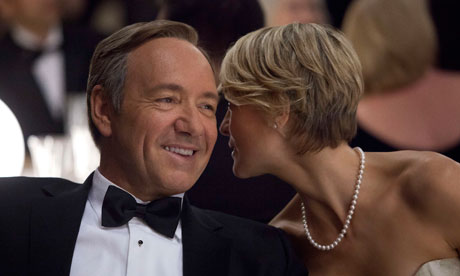Review of House of Cards (Season 1), Directed by David Finch
Rating: 9/10
If you take The West Wing, strip it of its fluffy idealism, make it dark and pessimistic, mix in contemporary gadgets (iPads, texting), keep the occasional Bartlet monologue but make it lessons in Machiavellian strategy, you get something like House of Cards. Francis “Frank” Underwood (Kevin Spacey), a Democratic Congressman from South Carolina, is the House Majority Whip and, as the first season opens, is passed over for Secretary of State by the new President of the United States, contrary to campaign promises. Frank decides to exact revenge and at the same time climb the ladder to power. The end goal? The presidency itself.

Frank’s wife, Claire, heads the Clean Water Initiative, a non-profit within the Beltway that plays a role in her husband’s politicking, while also competing at times with the Congressman’s ambitions. Another chess piece is Zoe Barnes, writing for a fictional news outlet, who acts as both Frank’s mistress and his pawn for leaking information and planting stories to churn the rumor mill for his benefit. Frank’s third important piece is Peter Russo, a Pennsylvania Congressman begrudgingly loyal to Frank.
Frank Underwood constantly breaks the fourth wall, speaking directly to the audience to reveal the inner workings of his scheming mind. The first season covers a host of issues: education policy and teacher unions, confirmation hearings for political nominations, campaign finance, and more. But unlike The West Wing, which focused a lot on substance in a pedagogical way, House of Cards captures our attention through its portrayal of the political process. The backroom deals, the leaked stories, the give-and-take, and the cut-throat, winner-takes-all freewheeling keep viewers engaged.
In a political season in the United States where deadlock and broken are common adjectives applied to Congress, House of Cards provides politicos with something to salivate over–power that can actually get stuff done and manipulation that can bulldoze all sorts of resistance. Admittedly, the TV show is often over-the-top in its portrayal of politics, but if it tried to be realistic and show what really goes on on the Hill, we would be in for a boring ride.

Fortunately, House of Cards is far from boring, if not rather heavy-handed at times. Frank Underwood is a tragic character in that his life is consumed by power and the pursuit for more of it. We might not initially find him tragic, with all his authority and capacity for getting what he wants, but every once in awhile we see hints of the truth–that the political winds can topple even the most powerful of men. Claire is a wonderful foil as someone who used to have different passions (for the arts) and still has a heart for helping the helpless and defending the weak, though often compromised by her own quest for power. We will have to wait to see what subsequent seasons bring–will the Underwoods make it to the top and show that in the end playing nice doesn’t win the race or will they topple and be a parable of the fleeting nature of power?
The clear message we get from House of Cards is the capacity for evil in the pursuit of power. But the hidden message (though perhaps not an intentional one) is the futility of human power and human greatness. Ponder on Shelley’s “Ozymandias.” The rise and fall of great personages is as certain as change itself. The true question lies in where we find our contentedness. Paul “learned to be content whatever the circumstances” (Phil. 4:11). We should do likewise. And so should Frank Underwood.pple and be a parable of the fleeting nature of power?
(As an aside, House of Cards has a strong dose of sexual content. Some episodes are quite graphic, while others don’t have any at all. There are also scenes portraying alcoholism and drug use. Hence the TV show may not be appropriate for all people.)












